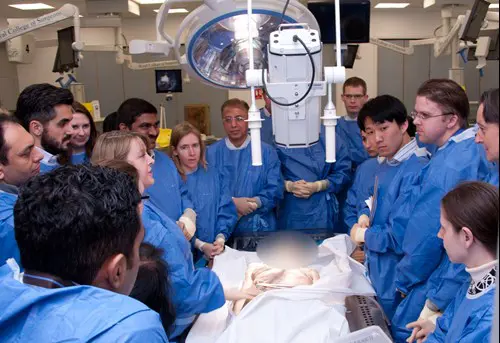Research Guidance
Information about surgical research and useful resources and links.
Introduction

Surgeons are trained to continually assess, improvise and create, and they do this with most cases they treat. Traditionally new procedures were reported at surgical meetings, published as case reports and case series and then evolved into large (often retrospective) observational studies. But innovations are leading to smaller increments in improvement and increasingly rigorous methods are needed to show improvement.
Surgical Research has its specific challenges, not least because the nature of a surgical procedure evolves and is rarely consistently delivered either within or between surgeons. The NCIN provides a thorough discussion of the challenges and opportunities for surgical cancer research in the UK.
The information on this page outlines the process for establishing a study.
More information on fundingResources
The key stages of developing a research study are outlined in a short presentation here.
Research problem & Hypothesis
First identify and define the clinical problem, then review the current literature to determine what is known and identify the gaps in the current knowledge, which will direct the research question and study plan. The research question or problem statement presents the idea which is to be examined in the study and is the foundation of the research study.
The hypothesis attempts to answer the research question.
Aims & Objectives
The aims of the study are the changes you hope to achieve as a result of your work, the objectives are the activities undertaken to bring these changes about.
Study design
When designing your study you will need to determine:
• Endpoints
• Prospective / retrospective
• Observational / interventional
• RCT / cohort / case-controlled
• Inclusion / exclusion criteria
• Patient pathway
• Participant involvement
• Statistical help
• Power calculation
Protocol
This needs to be written for the target audience:
• Funders
• Ethics committee
• Researchers delivering the research study
Patient Involvement
You will need to develop Patient Information Sheets and Consent Forms so it is important to get patient and public involvement (PPI) in the research design at this early stage.
Independent Cancer Patients Voice (ICPV), a patient advocate group independent of established UK cancer charities, aims to improve existing treatments for every cancer patient and develop new treatments by bringing the patients’ voice into clinical research. They do this through educating patients about research and also through representing the patient’s voice in the design and running of clinical trials.
INVOLVE is part of, and funded by the National Institute for Health Research, to support active public involvement in NHS, public health and social care research. As a national advisory group their role is to bring together expertise, insight and experience in the field of public involvement in research, with the aim of advancing it as an essential part of the process by which research is identified, prioritised, designed, conducted and disseminated.
Clinical Trials Routemap
The NIHR provides an excellent routemap for developing clinical trials. Although this is targeting Clinical Trials of Investigational Medicinal Products (CTIMPs), it provides an excellent overview of the phases required in trial development.
At this stage, consider getting help from the NIHR Research Support Service
Apply for Ethics
This is done using the Integrated Research Application System (IRAS) which allows simultaneous population of forms for R+D application and application for UKCRN portfolio adoption.
Consider applying for UKCRN portfolio adoption
Applying for UKCRN portfolio adoption will allow access to the NCRN infrastructure including research assistants and nurses. This is done via IRAS.
Governance
Find out if you need to apply for MHRA (Medicines and Healthcare Products Regulatory Authority) approval.
Get R+D approval from the study sponsor and other participating sites, ensuring all researchers have an up-to-date GCP (Good Clinical Practice) certificate. This can be done through courses arranged locally by the Clinical Research Network or can be done online.
Commencing recruitment, ensuring GCP and all regulatory authorities are complied with (eg MHRA and Human Tissue Authority).
Ensure resulting publications adhere to reporting guidelines such as REMARK and CONSORT.
Click here for an overview of why and how to write a paper and where to publish it.
Surgical Specialty Leads have responsibility both for the development of clinical networks to deliver multi-centre studies as well as ensuring that the studies are relevant to their subspecialty and their patients.
Surgical Specialty Leads work with the Surgical Trials Units (STUs) to develop clinical networks, train surgical investigators and deliver the clinical trials in a timely fashion.
The Breast Surgical Specialty Lead is affiliated to the Association of Breast Surgery, with whom they work to develop the clinical trials and clinical networks.
Please contact the ABS if you would like to get in touch with the Surgical Specialty Lead.
The National Cancer Intelligence Network (NCIN) was a UK partnership operated by Public Health England. It merged with the cancer registration service in 2016 becoming the National Cancer Registration and Analysis Service (NCRAS)
Their aims and objectives cover five core areas to improve the quality and availability of cancer data from its collection to use:
- Promoting efficient and effective data collection throughout the cancer journey
- Providing a common national repository for cancer datasets
- Producing expert analyses to monitor patterns of cancer care
- Exploiting information to drive improvements in cancer care and clinical outcomes
- Enabling use of cancer information to support audit and research programmes
To view the NCRAS website please click here.





